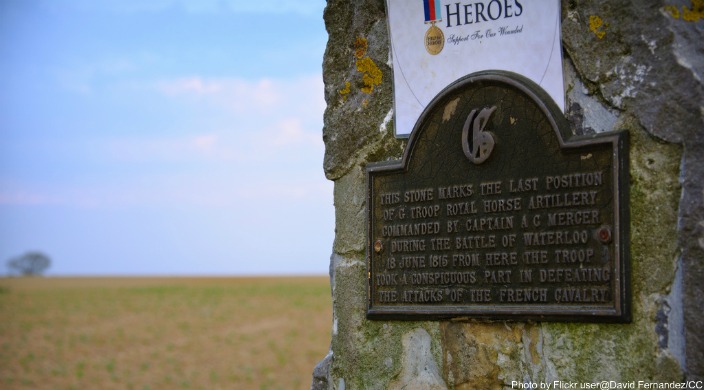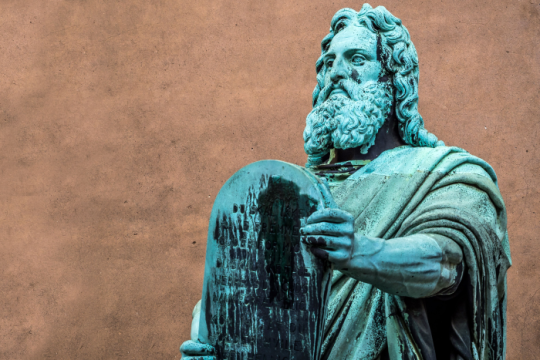
Two hundred years ago sometime after 10 PM on June 18, 1815 the guns at Waterloo fell silent. Of the 76,000 French soldiers who took the field earlier that morning against considerably larger armies of the Seventh Coalition as many as 26,000 lay dead on the blood soaked fields of rural Belgium. Napoleon had been decisively defeated and would be quickly and expeditiously sent into permanent exile. The age of the French Revolution, its social upheavals and radical ideas of liberty and equality was over and a new order based on monarchial power and stability was put into place by the leading rulers of Europe.
The architect of the new order was an Austrian diplomat, Prince Klemens Wenzel von Metternich (1773-1859), who was able to bring the United Kingdom, Germany and Russia into accord and eventually readmit France into the original "European Union." While Metternich himself was committed to Jewish political emancipation in Western Europe and personally had numerous Jewish friends, many if not most of his conservative colleagues were deeply anti-Semitic. In fact, at the Congress of Vienna concluded in anticipation of Waterloo by just a few days, Jewish civil rights suffered a significant set back with various polities reverting their laws on Jewish political status to the inferior conditions of the mid-18th century. The willingness of Europe's top leadership in the second decade of the 19th century to sacrifice Jewish concerns for the "greater good" was revisited 170 years later when the leading modern student and admirer of Metternich, Henry Kissinger, himself a victim of extreme instability in European politics, argued that the immigration rights of Soviet Jews was secondary to the need for maintaining global stability at the end of the Cold War.
For the Jews of West Europe, a difficult paradox had developed in the post-Napoleonic era pitting political stability against democratic values. Not only were hopes of equality and enfranchisement dashed for many Jews, particularly in Germany, but older, dark hostilities against Jews were unleashed in the form of Hep-Hep riots of 1819 and a long, bitter debate collectively called the "Jewish Question" which challenged the social and cultural capacity of Jews to become authentic "Europeans." Slowly and painfully, European Jews fought, won and expanded their civil rights across the continent although the deeper origins of anti-Semitism remained in tact and ultimately would release stronger and more vicious forms of anti-Jewish animus than ever before.
It was in this complicated vortex of post-Napoleonic Europe that Reform Judaism emerged. On the one hand, the impulse for Reform was predicated on earlier Enlightenment ideals of rationality and universal truths. On the other hand, the emerging Reform movement also embraced aspects of the new nationalism of the 19th century, various Romantic trends in music and architecture and a deep hope that the Jewish people was not marginal in world history but served as the vanguard of the emerging world order as envisioned by prophets in ancient Israel and the recast as the fundamental Reform doctrine of the "Mission of Israel." In the worldview of the architects of Reform Judaism, the purpose of Jewish life, the answer to the deep question of "why be Jewish" was to lead the world into a future messianic era in which Metternich's "concert of nations" would become humanity's global and permanent condition.
If Jewish re-marginalization was a consequence of Metternich's efforts to restore political order to Europe, then the willful de-nationalization of Jewish identity of western Jews to help secure their place in the "concert of nations" by many of Europe's modernizing Jews was viewed as a self-imposed necessity. Subsequently, bitter experience in the latter decades of the 19th century resulted in a radical evaluation of Jewish de-ethnization and the birth of the Zionist movement in select circles of European Jewish life.
In the wake of Waterloo, Reform Judaism and the other branches of modern Judaism, Jewish political liberalism, and modern Jewish conservatism and, ultimately, even Zionism emerged on the stage of Jewish history. For sure, we are now living in radically different times than in the days of Waterloo and the Congress of Vienna. Metternich's Europe ultimately disappeared in the carnage of World War I. Millions of Jews relocated to the United States and its unique environment. The Holocaust nearly exterminated Judaism's European center. A modern Jewish State was founded in the Land of Israel in 1948. Different waves of feminism challenged the role of gender in Jewish life and the digital revolution changed just about everything.
While historians debate the significance of Waterloo, viewed narrowly as a battle, the importance of Waterloo as metaphor is unimpeachable. Humanity, the Jewish people and the Reform movement all face an uncertain future. Whether we are streaming toward a future catastrophic Waterloo or to a new order of things and stability for the next hundred years is unknown. One thing alone is sure: we can either allow irrepressible historical forces to shape our future or we can take as much of the future into our hands as we possibly can on the road to the redemption.
Rabbi Lance J. Sussman, Ph.D . is the senior rabbi of Reform Congregation Keneseth Israel in Elkins Park, PA. He has written numerous books and articles in the field of American Jewish history and has taught at Princeton University, Binghamton University (SUNY) and Hunter College (CUNY). Rabbi Sussman is currently working on a book on Jews, Judaism and law in America.



